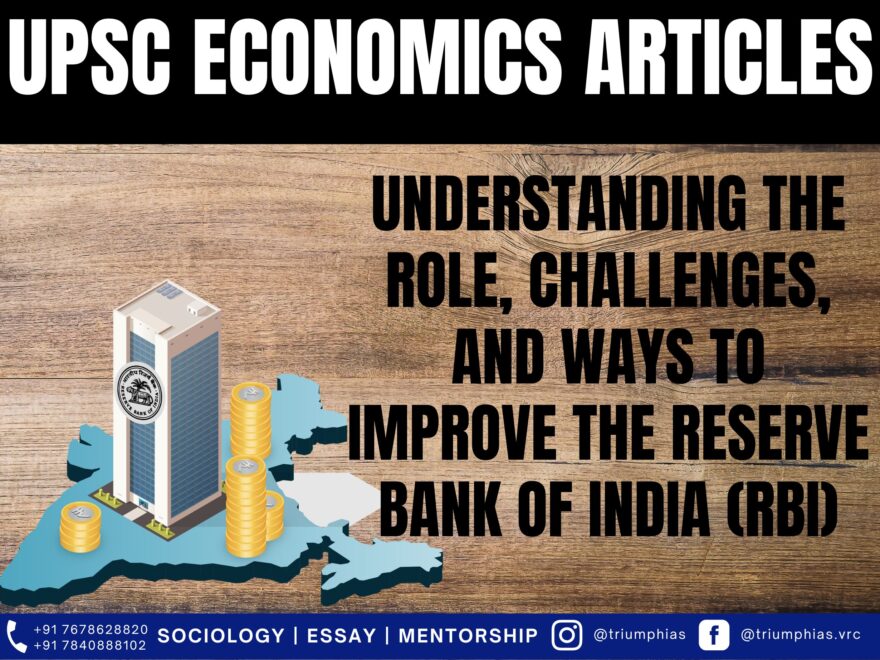Reserve Bank of India (RBI)
(Relevant for Economics Section of General Studies Paper Prelims/Mains)

Reserve Bank of India (RBI)
The Reserve Bank of India (RBI) stands as India’s central banking institution, established in 1935 to ensure stability in the nation’s monetary landscape. Its core mandates encompass overseeing the currency and credit framework, administering foreign exchange reserves, and exercising regulatory supervision over the banking industry.
Role of RBI in monetary policy
- Regulating money supply: A core responsibility of the RBI involves overseeing the money supply within the economy. This is achieved through the manipulation of reserve ratios, open market operations, and discount rates. Through careful adjustment of these factors, the RBI ensures that the money circulation remains balanced, preventing both excessive inflation and deflationary pressures.
- Controlling inflation: An equally significant role of the RBI is to effectively manage inflation. This is achieved by executing monetary policy actions such as raising interest rates and curtailing the money supply. In addition to these measures, the RBI employs tools like the Cash Reserve Ratio (CRR) and the Statutory Liquidity Ratio (SLR) to effectively curb inflationary tendencies.
- Maintaining exchange rate stability: The RBI also assumes a pivotal position in upholding exchange rate stability. This is accomplished through prudent management of foreign exchange reserves and the effective regulation of the foreign exchange market. The RBI intervenes by purchasing or selling foreign currencies as required to sustain the stability of the national currency.
- Supervising the banking sector: Overseeing and regulating the Indian banking sector is a central role of the RBI. It grants banking licenses, formulates operational guidelines, and conducts thorough inspections to ensure adherence to regulatory standards. Furthermore, the RBI holds the authority to impose penalties on banks found to be in violation of these regulations.
Challenges faced by RBI:
- Inflation management: Despite the efforts undertaken by the RBI to curb inflation, it continues to present an enduring hurdle. Escalating costs of vital commodities and services, notably within the food and fuel domains, persist in exerting inflationary pressure.
- Technological progress: Given the swift strides witnessed in the financial sector’s technological landscape, the RBI must remain attuned to these developments to uphold monetary stability. The surging adoption of digital transactions, crypto currencies, and block chain innovation introduces fresh complexities that the RBI must address to safeguard the security and steadiness of the financial framework.
Ways to Improve RBI’s Effectiveness:
- Strengthening communication avenues: The RBI can heighten its efficacy by fortifying its communication pathways with both the public and the banking sector. Moreover, it can utilize diverse platforms like social media, press briefings, and workshops to disseminate its policies and determinations.
- Enhancing transparency: The RBI can augment its transparency by furnishing additional insights into its policies and judgments. This can involve regular publication of reports and data concerning its operations, and the implementation of measures to amplify the transparency of its decision-making process.
- Boosting accountability: To bolster accountability, the RBI could institute an independent oversight committee tasked with reviewing its operations and determinations. This committee would also have the responsibility of holding the RBI answerable for its performance and suggesting enhancements.
- Amplifying collaboration with other entities: The effectiveness of the RBI can be elevated through enhanced collaboration with other entities, such as the government, foreign central banks, and international organizations. Such collaboration can facilitate the formulation of more robust policies, as well as the exchange of knowledge and expertise
RBI plays a crucial role in maintaining monetary stability in India. It regulates the money supply, controls inflation, maintains exchange rate stability, and supervises the banking sector.To improve its effectiveness, RBI needs to strengthen its communication channels, enhance transparency, improve accountability, and increase cooperation with other institutions. By implementing these measures, RBI can continue to fulfill its mandate of maintaining monetary stability in India.
To master these intricacies and fare well in the Sociology Optional Syllabus, aspiring sociologists might benefit from guidance by the Best Sociology Optional Teacher and participation in the Best Sociology Optional Coaching. These avenues provide comprehensive assistance, ensuring a solid understanding of sociology’s diverse methodologies and techniques.
Reserve Bank of India, RBI, monetary policy, inflation control, money supply, banking supervision, exchange rate, central bank, Indian economy, financial stability, transparency, accountability, effectiveness, foreign exchange reserves, challenges, improvement Reserve Bank of India, RBI, monetary policy, inflation control, money supply, banking supervision, exchange rate, central bank, Indian economy, financial stability, transparency, accountability, effectiveness, foreign exchange reserves, challenges, improvement, Best Sociology Optional Coaching, Sociology Optional Syllabus.

Choose The Best Sociology Optional Teacher for IAS Preparation?
At the beginning of the journey for Civil Services Examination preparation, many students face a pivotal decision – selecting their optional subject. Questions such as “which optional subject is the best?” and “which optional subject is the most scoring?” frequently come to mind. Choosing the right optional subject, like choosing the best sociology optional teacher, is a subjective yet vital step that requires a thoughtful decision based on facts. A misstep in this crucial decision can indeed prove disastrous.
Ever since the exam pattern was revamped in 2013, the UPSC has eliminated the need for a second optional subject. Now, candidates have to choose only one optional subject for the UPSC Mains, which has two papers of 250 marks each. One of the compelling choices for many has been the sociology optional. However, it’s strongly advised to decide on your optional subject for mains well ahead of time to get sufficient time to complete the syllabus. After all, most students score similarly in General Studies Papers; it’s the score in the optional subject & essay that contributes significantly to the final selection.
“A sound strategy does not rely solely on the popular
Opinion of toppers or famous YouTubers cum teachers.”
It requires understanding one’s ability, interest, and the relevance of the subject, not just for the exam but also for life in general. Hence, when selecting the best sociology teacher, one must consider the usefulness of sociology optional coaching in General Studies, Essay, and Personality Test.
The choice of the optional subject should be based on objective criteria, such as the nature, scope, and size of the syllabus, uniformity and stability in the question pattern, relevance of the syllabic content in daily life in society, and the availability of study material and guidance. For example, choosing the best sociology optional coaching can ensure access to top-quality study materials and experienced teachers. Always remember, the approach of the UPSC optional subject differs from your academic studies of subjects. Therefore, before settling for sociology optional, you need to analyze the syllabus, previous years’ pattern, subject requirements (be it ideal, visionary, numerical, conceptual theoretical), and your comfort level with the subject.
This decision marks a critical point in your UPSC – CSE journey, potentially determining your success in a career in IAS/Civil Services. Therefore, it’s crucial to choose wisely, whether it’s the optional subject or the best sociology optional teacher. Always base your decision on accurate facts, and never let your emotional biases guide your choices. After all, the search for the best sociology optional coaching is about finding the perfect fit for your unique academic needs and aspirations.
To master these intricacies and fare well in the Sociology Optional Syllabus, aspiring sociologists might benefit from guidance by the Best Sociology Optional Teacher and participation in the Best Sociology Optional Coaching. These avenues provide comprehensive assistance, ensuring a solid understanding of sociology’s diverse methodologies and techniques. Sociology, Social theory, Best Sociology Optional Teacher, Best Sociology Optional Coaching, Sociology Optional Syllabus.
Best Sociology Optional Teacher, Sociology Syllabus, Sociology Optional, Sociology Optional Coaching, Best Sociology Optional Coaching, Best Sociology Teacher, Sociology Course, Sociology Teacher, Sociology Foundation, Sociology Foundation Course, Sociology Optional UPSC, Sociology for IAS,
Follow us :


https://t.me/VikashRanjanSociology
Find More Blogs
|
Scope of the subject and comparison with other social sciences |
|||
|
|
|
|
Modernity and social changes in Europe |


One comment